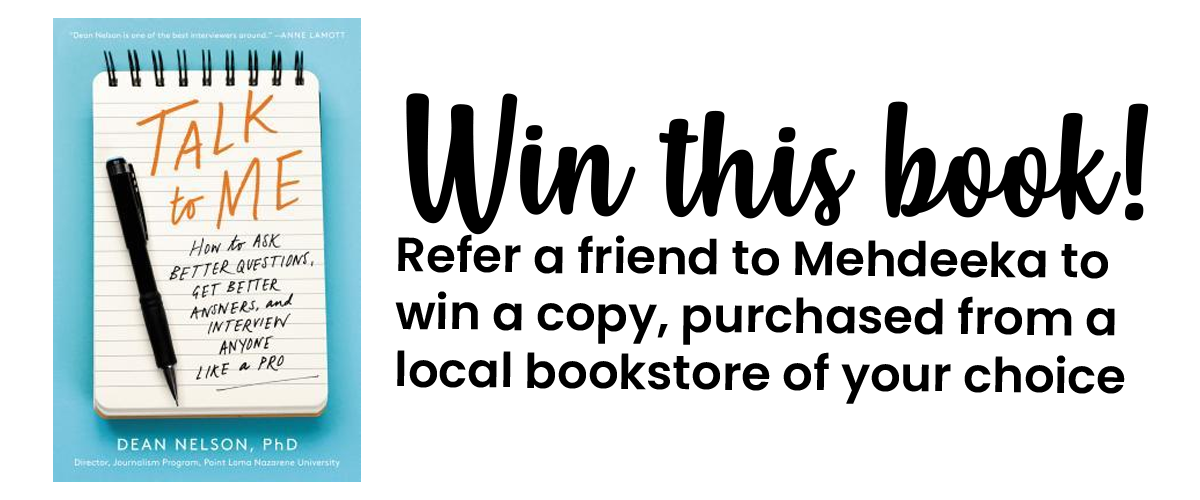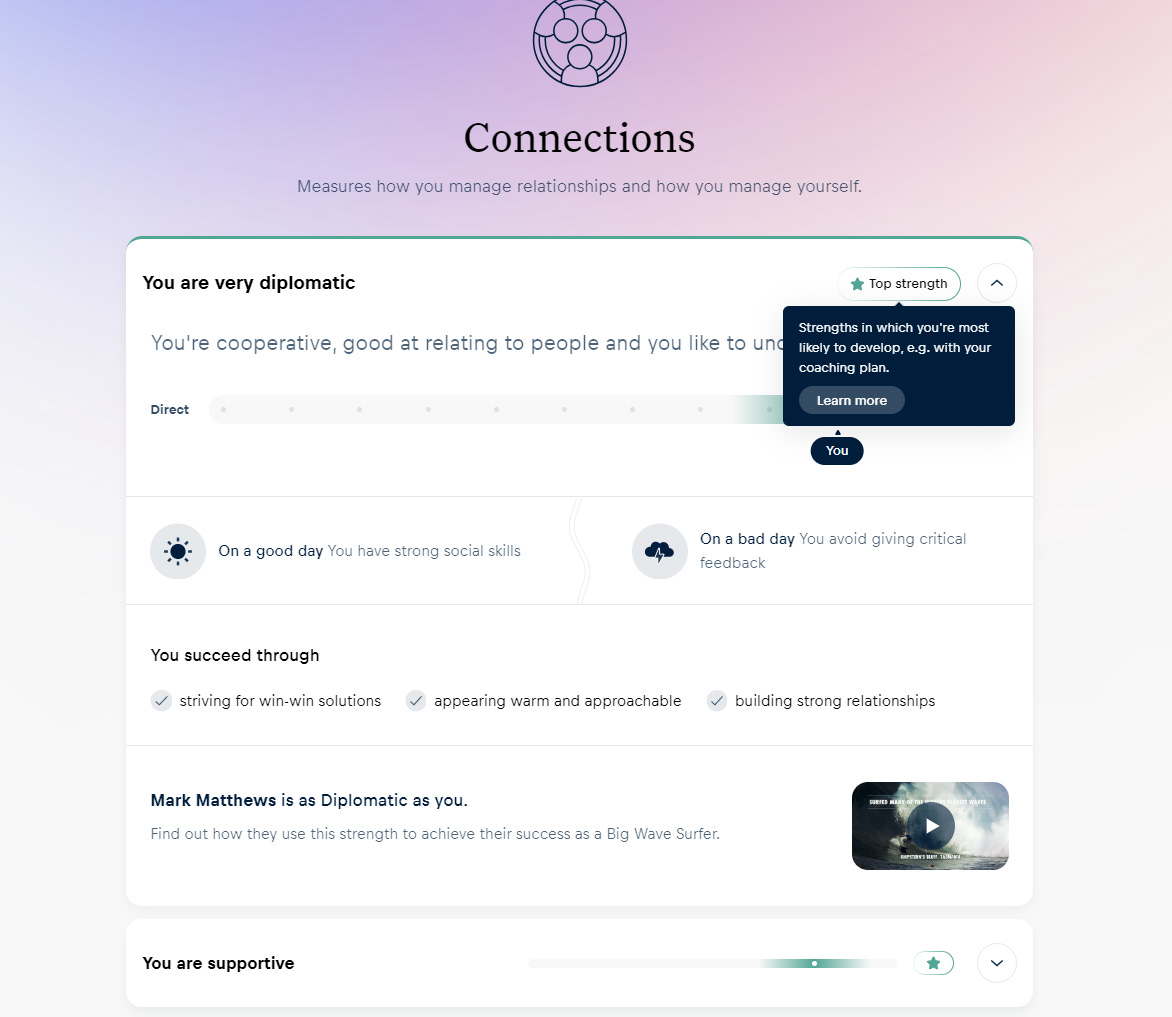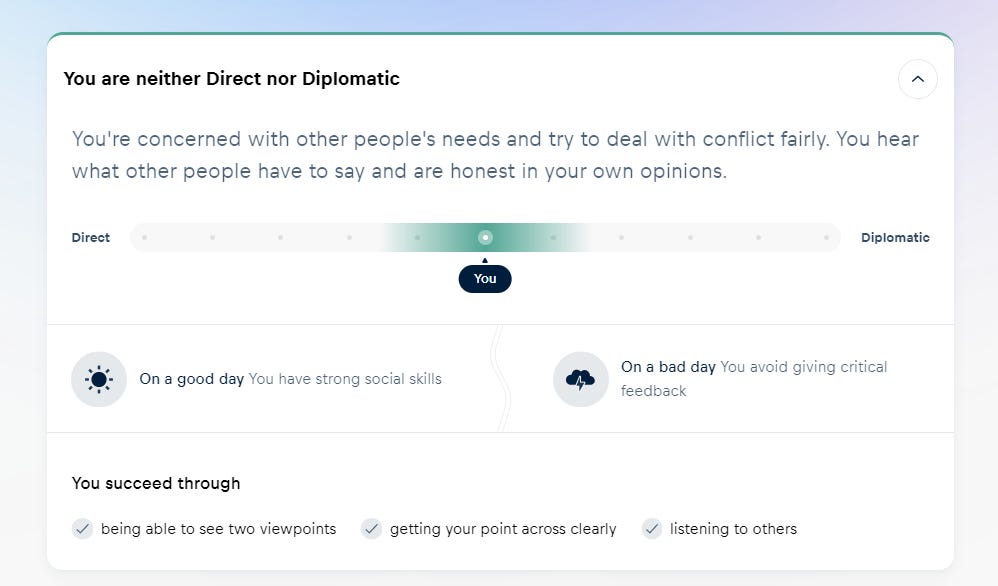An interview with solo marketer, Kaylee Liu
Season 8, Issue 2: First interview of the season!
📬 In this issue:
An interview with solo marketer, Kaylee Liu, on juggling workloads, deciding what to work on, and mixed skillsets
A couple of career resources
Refer a friend, get a book!
Each week there’s a different book up for grabs for people who refer friends and colleagues. This issue’s book is: Talk to Me: How to Ask Better Questions, Get Better Answers, and Interview Anyone Like a Pro by Dean Nelson. I finished this recently and took a lot from it. Dean Nelson is a journalist and professional interviewer, and his insights on how to get people to answer questions, stay in control of an interiew, and ask the right questions are super relevant for marketers who conduct market research, customer interviews, or any other research work.
Well done to Chris C who nabbed last week’s book! To get a copy of Talk to Me, all you have to do is refer at least one friend between now and next week’s issue. If you’re selected, you’ll get to pick which bookstore I ship this to you from, so international Mehketeers are welcome too!
Hi Mehketeers, and welcome Kaylee!
Kaylee is the Marketing Manager at SurePact, a grant management platform. In a previous life, she was also a designer and a paid digital specialist, and we touch on that in the interview.
I met Kaylee through Generate, the ANZ community for in-house B2B marketers (join us here!) and when she shared an update about how she was going after transitioning to a solo marketer role, I really wanted to get her on Mehdeeka. Here’s how that went!
Kayla: You've been in your role for 7-8 months now as the only marketer, what kind of projects or marketing functions have you worked on in that time, and what are you currently working on?
Kaylee: There were a lot of tactical marketing activities done in the past at SurePact, but coming in as the first marketing hire meant I was accountable for bringing some rhyme and rhythm to what we did in our marketing and why we did it. Since then, I've set up foundational demand generation and demand capture motions, aligned on funnel definitions with Sales, built a basic attribution model in our CRM, did a light brand and website refresh, and started building out our content across blogs, social, and email. We've also dug into our positioning to understand how we are differentiated vs competitors, which fed into our website messaging and ads.
Currently, I am working on our SEO roadmap and deepening my own subject matter expertise.
K1: What was the first project you worked on and how did you decide that was the highest priority?
K2: One of the areas I knew needed solving was the inbound pipeline (which was at zero). I wanted to get demo bookings trickling in as soon as possible after setting up our demand capture funnel (the analytics, website forms, CRM attribution, and email management).
In most cases, starting with demand capture or bottom-funnel audiences is the best way to get results in the shortest amount of time.
1) How much existing demand is there for the problem we solve?
2) What's the fastest way to prove it?
I set up a landing page, a one-campaign Google Ads account with a small monthly budget, and got started in two days. We got new demo bookings from our ICP before the campaign was a month old, and it proved that there was existing search demand for this problem.
For first-marketers/solo marketers the most important thing is to "get a win" in the shortest amount of time possible - and I mean in 30 days or less. Marketing is seen as a cost centre in most businesses and your #1 job is to build trust. Fix a problem that annoys the CEO, get inbound demo bookings, or ask the Sales team how you can help improve sales deck content. I think it's dangerous when marketers going from mature companies to a startup get sucked into spending their first quarter on a website redesign project, creating an overcomplicated marketing strategy, or lobbying for a new CRM, with no results to show for it by quarter two and all their political capital spent.
K1: As a one person marketing team, what resources do you have available? Are you using agencies or freelancers? What tools help you do your job every day?
K2: I have support from an agency and freelancer on organic social, design, and PR projects. I'm a Virgo, so I live and die by my perfectly colour-coded ClickUp calendar that I use to plan what I need to do each day. It prevents me from overloading the days where there are time-sensitive recurring tasks like ad account audits and monthly budget admin, and makes it easy to reshuffle tasks when priorities change. I've gone completely paperless for a few years now, and have forced myself to stick with one productivity tool as a source of truth. If it's not in there, it doesn't exist!
My other favourite tool at the moment is Dealfront Leadfeeder, which helps us identify accounts visiting the website. Because our sales cycles are long and our TAM is quite small, it's a good leading indicator to assess if we've been reaching the right companies with our marketing and outbound efforts, before they convert into demos.
K1: How are you juggling long term and short term priorities?
K2: I'm lucky to be working in a culture where Marketing isn't viewed as a service function, and I have the freedom and space to decide how my time is spent, which isn't always the case with Marketing teams who might field a lot of requests from other teams. This means I can set my own deadlines, and long-term brand building initiatives are planned with the right time horizon, then broken down into tasks for executing in the short-term.
K1: What's something you struggled with as a solo marketer, but have found a solution for?
K2: My main struggle as a solo marketer is the limited capacity. You're the one who has to go to all the meetings (there's no one else!) but also the one who needs to execute. I'm a recovering workaholic and have a terrible tendency to bite off more than I can chew in a day, so I have to remember to not overcommit and rigorously prioritise. I'm getting better at looking ahead and rescheduling tasks if I have a meeting-heavy day, and I wrote some key principles for work on my whiteboard - one of which is "don't feel guilty about a slow day".
K1: In a past life you were also a designer, what's your stance on marketers being multi-disciplined? Are you ever tempted to become a specialist rather than a generalist or do you see that as your advantage?
K2: I have too much fun being a generalist! I've been a specialist multiple times - first as a designer, then in paid digital - but I was never satisfied with only playing in my little corner, so being a deep generalist suits me better. I don't think I'd go back to specialising in a certain skill set, and I do think having lived experience running my own ads, designing creative, writing content, and planning websites makes me a better people manager (both internally and with outsourced resources). With the advent of AI, I think the best marketers will be deep generalists who can flex their focus towards where they can win, and use AI to increase their speed and capacity.
Career resources
Kaylee makes so many great points, from proving your worth within 30 days to putting in boundaries around work and building your career around things that give you energy and satisfaction.
I feel like I’m constantly thinking about my career, and while I’m enjoying being a contractor right now I do have this thought of “I won’t be doing this forever”, and so I’m taking my time to consider what would actually draw me back to a full time role. As part of that, I decided to redo the Red Bull Wingfinder quiz for myself (having last done it in I think early 2022.)
This quiz is much more around what skills you naturally gravitate to, and how to build your career around them as you’re more likely to be successful, as opposed to trying to brute force yourself through a skill or job that requires something you just don’t have.
I was kind of surprised, my results have mellowed out! For reference, this was my 2022 result (apologies for the pop up):
And here’s my 2024 results:
Honestly I’d probably credit this to me being less flexible when I was younger, and also having gone through ✨therapy✨ which is where I learned I (used to?) have a strong belief that making mistakes deserved punishment (in myself and in others.) Now mistakes don’t bother me so much.
I do still think diplomacy is a good skill (probably comes from so much of my career including managers who needed “managing up”) and I’d like to think I could still pull it out when needed, but I’m just pulling it out less in circumstances where it’s maybe not warranted.
And for anyone who’s doubting doing a career quiz:
The second quiz I was reminded about is this one from Teal. It’s more about what style of working you fit best into, and the idea is to give you this insight so when you go into a job interview you can ask culture based questions to assess whether the company’s working style is one you’ll do well in (or find really draining.)
I hate quizzes that put you into personality buckets, so I like that these two are around skills and working styles and are more encouraging than saying one person is “blue” and another is “red”.
That’s it for what’s in my brain this week,
Kayla





